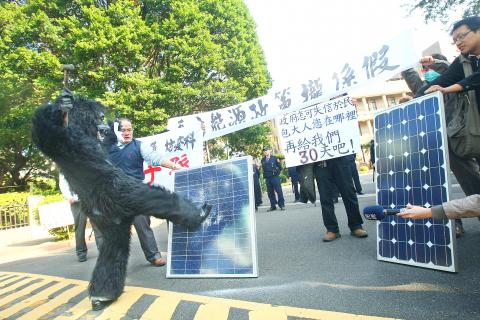Dozens of solar power generation systems outfitters yesterday staged a protest outside the Executive Yuan in Taipei, petitioning for the government to take action to help them, following a recent reversal in procurement policy on solar power, which they will say will undermine the development of renewable energy.
Led by Life Lai (賴增華), head of the Solar Power Generation System Association, the protesters smashed a solar panel to express their anger over the policy announced on Friday last week, that the wholesale price to be paid for power generated by solar projects will be decided on the date investors’ solar power facilities are completed.
Previously, the wholesale price was decided on the date when the contract was signed.

PHOTO: CNA
The announcement came out of the blue as the Bureau of Energy under the Ministry of Economic Affairs reassured solar energy investors in October that the wholesale price determined on the date when the contract was signed would remain unchanged for 20 years.
According to the bureau, in light of the decreasing cost of solar equipment, state-owned Taiwan Power Co (Taipower) will lower its solar power procurement price next year to NT$9.6 per million kilowatts, from between NT$11 and NT$13 per million kilowatt this year.
The bureau said the new purchase price will be applied to solar projects that have not been completed by the end of this year, regardless of any contracts signed.
Cheng Po-wen (鄭博文), an investor, said the new policy means it will take him four more years to recover the cost of his investment of NT$1.28 million (US$43,100).
To compensate them for losses caused by the policy reversal, investors demanded the government grant solar investors a grace period of 30 to 60 days with regards the current purchase price.
On Monday, Pintung County Commissioner Tsao Chi-hung (曹啟鴻) also lashed out at the policy change as about 100 land owners whose farms were severely damaged by Typhoon Morakot last year decided to install solar panels at his encouragement.
The ministry has said the policy change was aimed at preventing rent-seeking behavior as some investors purposely delayed investments after contracts were signed.
“The accusation was not true, and the government should not treat its people like thieves,” Lai said.
It was not investors’ rent--seeking that resulted in procrastination, but the complicated application procedures they had to wade through in complying with rules on the government purchase of solar power, Lai said.
“The policy reversal not only betrayed the trust of the people but has also adversely affected the development of green energy,” Lai said

Alain Robert, known as the "French Spider-Man," praised Alex Honnold as exceptionally well-prepared after the US climber completed a free solo ascent of Taipei 101 yesterday. Robert said Honnold's ascent of the 508m-tall skyscraper in just more than one-and-a-half hours without using safety ropes or equipment was a remarkable achievement. "This is my life," he said in an interview conducted in French, adding that he liked the feeling of being "on the edge of danger." The 63-year-old Frenchman climbed Taipei 101 using ropes in December 2004, taking about four hours to reach the top. On a one-to-10 scale of difficulty, Robert said Taipei 101

Nipah virus infection is to be officially listed as a category 5 notifiable infectious disease in Taiwan in March, while clinical treatment guidelines are being formulated, the Centers for Disease Control (CDC) said yesterday. With Nipah infections being reported in other countries and considering its relatively high fatality rate, the centers on Jan. 16 announced that it would be listed as a notifiable infectious disease to bolster the nation’s systematic early warning system and increase public awareness, the CDC said. Bangladesh reported four fatal cases last year in separate districts, with three linked to raw date palm sap consumption, CDC Epidemic Intelligence

US climber Alex Honnold left Taiwan this morning a day after completing a free-solo ascent of Taipei 101, a feat that drew cheers from onlookers and gained widespread international attention. Honnold yesterday scaled the 101-story skyscraper without a rope or safety harness. The climb — the highest urban free-solo ascent ever attempted — took just more than 90 minutes and was streamed live on Netflix. It was covered by major international news outlets including CNN, the New York Times, the Guardian and the Wall Street Journal. As Honnold prepared to leave Taiwan today, he attracted a crowd when he and his wife, Sanni,

Taiwanese and US defense groups are collaborating to introduce deployable, semi-autonomous manufacturing systems for drones and components in a boost to the nation’s supply chain resilience. Taiwan’s G-Tech Optroelectronics Corp subsidiary GTOC and the US’ Aerkomm Inc on Friday announced an agreement with fellow US-based Firestorm Lab to adopt the latter’s xCell, a technology featuring 3D printers fitted in 6.1m container units. The systems enable aerial platforms and parts to be produced in high volumes from dispersed nodes capable of rapid redeployment, to minimize the risk of enemy strikes and to meet field requirements, they said. Firestorm chief technology officer Ian Muceus said